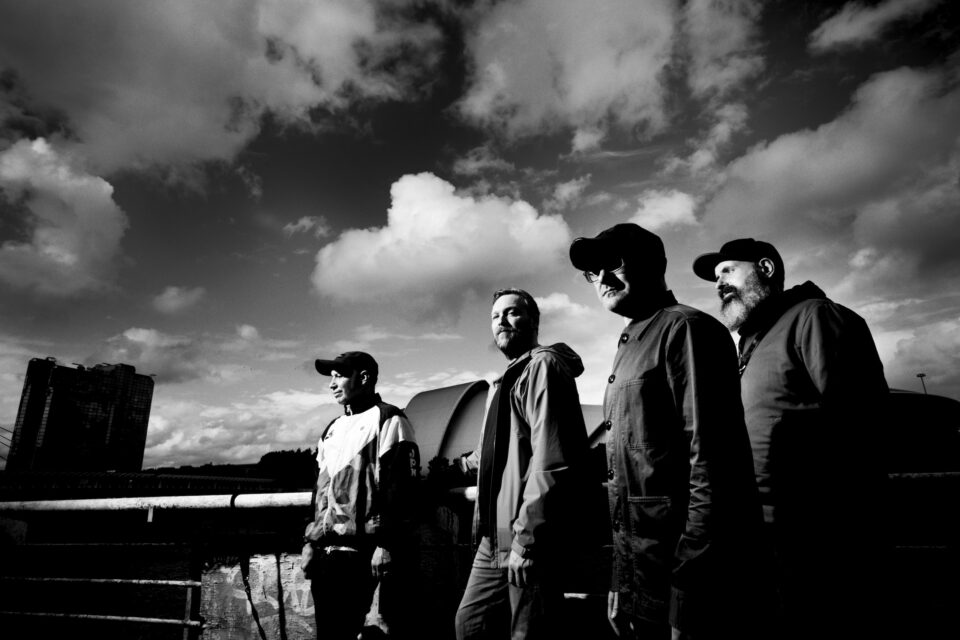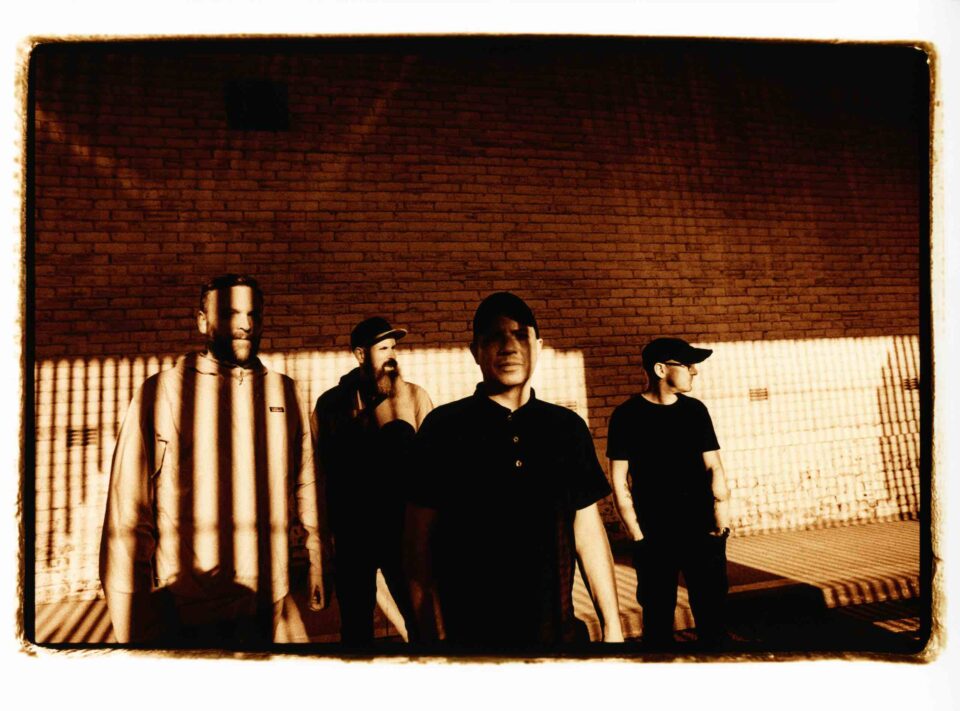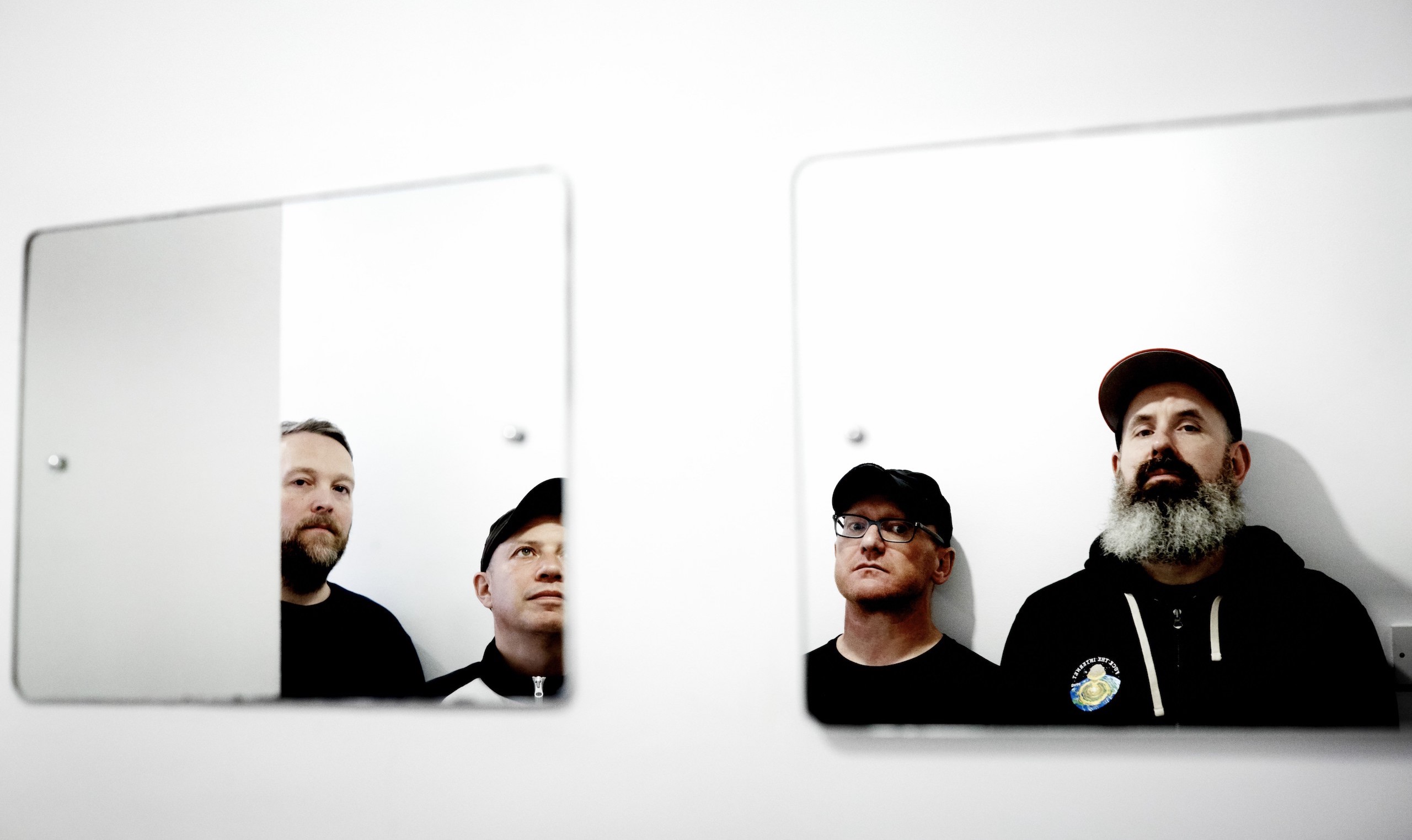For the past 30 years, Mogwai have been confounding expectations for what it means to be a rock band in the modern age. Largely shunning vocals, the Scottish group specializes in epic post-rock instrumentals, and their virtuosity is on full display on their eleventh studio album, The Bad Fire. During a video call from his home in Glasgow, guitarist (and occasional vocalist) Stuart Braithwaite lists the reasons why making this album felt like a different experience: “We did it in Scotland, which we haven’t done for quite a long time. We were quite late to all get together and play because Barry [Burns, guitarist/keyboardist] has had some issues with his family—one of his little girls was really sick. So it was a very intense record. It was harder than normal just because things were turbulent in people’s lives.”
Noting that Burns’ daughter is doing better now, he adds that things leveled out once they entered the studio, where the band members’ method of letting songs emerge without undue interference once again took hold. “We don’t really overanalyze things,” Braithwaite says. “For us, over-intellectualizing the music has never worked. I mean, we rehearse, but we don’t really talk about it. We just play until we like it.” What comes out of this process, he says, “is quite naturally emotional, rather than us having emotions that we have to purposely put into the music. I think the music just has that element to it. I guess everything that we’re living through will be reflected in that, but it’s almost a subconscious thing for us.”
This laissez-faire approach also led to their choice of “The Bad Fire” as the album name, as well. “A lot of our titles come from things we remember as children, and [‘the bad fire’] is something that older people would say to you when you were a kid,” Braithwaite says. “Like, if you don’t do something, you’re going in the bad fire—meaning you’re going to hell. I guess there’s parallels in the struggles we’ve had. But to be honest, we weren’t even thinking about it that deeply. We just thought it was funny.”
This touch of humor comes across in the accompanying video for “Lion Rumpus,” one of the album’s pre-released singles. Director Antony Crook came up with the shoot’s charming concept of following a dog walker on his rounds throughout Manhattan. “He just said he’s got this friend that walks dogs in New York, and it would be good to attach a bunch of GoPros to the dogs,” Braithwaite says. He believes the heartwarming video ties in nicely with The Bad Fire’s overall mood: “I actually think the record is quite a hopeful record. I like the fact that that video has that element to it.” Crook was also the director for Mogwai: If the Stars Had a Sound, a 2024 documentary about the band. “It was a really nice experience, but quite a strange one,” Braithwaite says of seeing his own story told in a film. “I think the thing I found strangest was seeing us play, because I’ve obviously never seen our own band playing. How intense and how loud it is. It doesn’t feel that way to play it.”
“For us, over-intellectualizing the music has never worked. I mean, we rehearse, but we don’t really talk about it. We just play until we like it.”
Braithwaite’s own story began in Glasgow, and his future was initially unclear. “I didn’t try very hard at school, but I didn’t want to get a job,” he says. “So I went to college to play guitar, and met some friends and we started a band. That band broke up, and then we started Mogwai. That’s really all that happened. It was never any kind of big master plan. It was just a bunch of friends making music, and then enough people liked it that we got to actually just keep doing it.” Braithwaite says he and his bandmates knew they were on the right track because they all cited the same artists as influences: “The music we were into was The Cure and Sonic Youth and The Velvet Underground—bands playing guitars, but doing something a little bit different.”

Through trial and error, Mogwai eventually settled on the unusual approach of making mostly instrumental music. “When we first started, it was probably about a 50/50 split, and I think more of the songs without vocals turned out good than the ones that did. It was just a process of elimination,” Braithwaite says. Named after the magical creatures in the 1984 film Gremlins, Mogwai released their full-length debut album Mogwai Young Team in 1997, and it got into the upper reaches of the UK music charts. With their ensuing albums, they continued to inch their way up the charts, but retained more of a cult status. Finally, in 2021, Mogwai’s fiercely loyal fanbase launched a social media campaign that helped bring their last album, As the Love Continues, to #1 on the Official UK Album Chart. That was, Braithwaite says, “Really special. It was amazing. It was really touching. It was quite emotional, and something I’ll never forget.”
“You don’t want to be the band that everyone’s like, ‘Oh, they used to be good and now they’re terrible.’ We’re music fans, too, and you’ve got to try and have some dignity.”
That success means that Braithwaite and his bandmates feel some pressure as they release The Bad Fire, though he says that most of these high expectations are internally driven. “We want to prove to ourselves that we’re still making good music,” he says. “If we make a record, we’re going to be traveling the world playing these songs for years, so we definitely want them to be good. Also, you don’t want to be the band that everyone’s like, ‘Oh, they used to be good and now they’re terrible.’ We’re music fans, too, and you’ve got to try and have some dignity.”

A big help, he says, is the fact that the members have a deep friendship, which has enabled them to endure the ups and downs during the past three decades. “It was just a case of finding people that work well together and like each other’s company, because in a band, you spend a lot of time together,” Braithwaite says. “So it’s really just finding a combination of people that enjoy playing music together and are all right spending an awful lot of time hanging about in airports and in vans.” He also credits the fans for continuing to give Mogwai such strong support, noting how the band is giving them something meaningful in return: “Human beings are essentially emotional, whether they convey it publicly or not,” he says, “and I think music is something that we use to make us feel something. And our music does that, so I think that that’s probably why people still want to hear it.”
When asked if the band has any specific goals for their next 30 years together, Braithwaite grins and quips, “I think just being alive for another 30 years is a pretty good goal!” Then, more seriously: “I would love to still be making music. I think I’m very lucky to make a living playing electric guitar and traveling the world. It’s a dream, really. And I still enjoy the boys’ company and coming up with new music. What’s not to like?” FL







